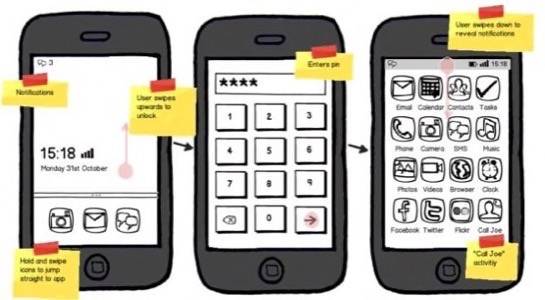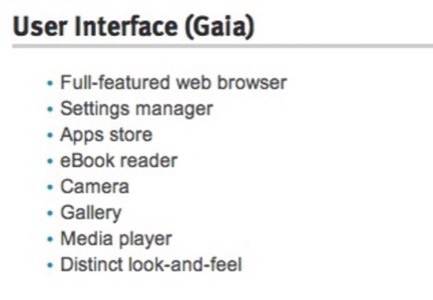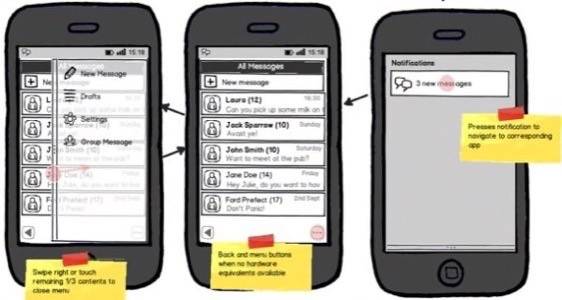Mozilla is not just thinking of putting together a mobile operating system, the open source project actually has a roadmap in place to bring a demo sometime in the first quarter of 2012. We have seen a bunch of would-be mobile OS competitors rise and fall in fortunes over the last year or so, but Mozilla might actually have the name recognition and engineering clout to make a real dent in the market.

Mozilla’s mobile OS would be open in the truest sense of the term open. Open is what Mozilla does. Mozilla will be working on bringing HTML5 as a fully functional OS to mobile. A look at Mozilla’s roadmap is below.
Web Based With A Web App Store
Mozilla’s project is built off a concept called Boot 2 Gecko (B2G). Gecko is Mozilla’s open source browser engine that runs the Firefox browser across platforms. Gecko is used in Mozilla’s Android browser, codenamed Fennec (an arctic fox). Gecko has its roots in Netscape in the late 1990s and has evolved through several names and iterations in the last decade plus. Mozilla believes it is now ready to fully power a mobile device.
Mozilla’s mobile OS will run several elements of the Android backend. Most of that has to do with native phone functions such as messaging, battery, telephony and contacts. Those are the simplest and most basic functions of Android and can be accessed by anyone. These are the building blocks of a mobile OS and are on track for Q4 2011.
Also on track for this quarter are the backend system and user interface. The backend system is called Gonk and the goal is to have it ready for all device APIs by Q1 2012. Basically, the roap map shows us that Mozilla is building the backend systems this quarter and will be trying to tie all the processes together in time for a demo early next year. The UI is called Gaia and includes home screen, lock screen, SMS, a web browser, contacts manager and a dialer to be set up in the first round of development. You cannot have a functional working prototype of any phone, smart or otherwise, without these basic features.

Once everything is in place, Mozilla will set up “Project Eideticker” for testing purposes. Eideticker “is a person with a photographic memory.”
Apps Repository & Refinement
Gecko, Gonk and Gaia will then move to features and refinements. The top item on the roadmap for Gecko is open web apps and an app store. This is where Mozilla’s vision gets interesting. Outside of a couple projects (like MobiUS from appMobi) and some niche stores, there is really no central spot for a user to find mobile Web apps. This is a problem. The HTML5 and mobile Web advocates can shout from the rootops that they are going to disrupt the native application ecosystem of Android and Apple, but if users cannot find apps, nobody will end up caring. The idea is to make it seem like there is no difference from a mobile Web app and a native app.
You can check out the prototype demo app store from Mozilla here. Facebook told us that they were not going to come out with a Web app repository. Google pushes the Android Market, Nokia has tied itself to the Windows Phone system, webOS is currently dead in the water and if there are any good apps for Tizen/MeeGo, please, let us know.
Other Gecko roadmap items that are scheduled for Q1 2012 are lights, sensors (which will have both Gonk and Android back ends), a vibrator (Android), and developer tools like CSS, DOM and JS. There are also physical needs of the device, such as Bluetooth, USB and NFC, all of which have been given the stretch designation at this point.
Where consumers will get interested is in the Gaia features to be implemented next year. Here is a snapshot from the roadmap.


In the “productization” stage, set for Q2 2012, Mozilla will institute a updating mechanism and tie it to the final piece of the puzzle, WebRTC. That is Mozilla’s real-time communications API that will allow everything else that it has built to be integrated into the Web.
Refreshing, Open and Coming Sooner Than Later
Mozilla is uniquely situated to pull off this type of development in a short amount of time. It has all the tools and has been working on mobile browsers for Android for long enough that an OS is not particularly a jump.
On the other side, we have Ubuntu. Canonical more or less just decided that they would go to mobile and have no roadmap, no alpha code, no … anything. Nobody expect to see anything in the mobile realm from Ubuntu until, at the very earliest, late 2012. If everything goes right for Mozilla, there could be a flagship device of whatever they are going to call this mobile OS by late next year.
What is great about this project from Mozilla is that everything is completely open and easy to track. As a developer, hacker, coder (and yes, tech journalist), that is extremely refreshing. No having to dig through endless sites to find a particular piece of documentation, Mozilla put it all right there in front of you.
Does Mozilla’s mobile OS project excite you? Can the open source project pull it off and get it to market? Will this all end up as a proof of concept or can Mozilla really make a dent in the Mobile OS Game Of Thrones? Let us know in the comments.









